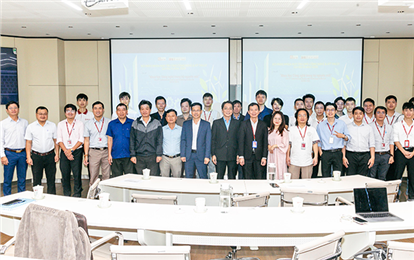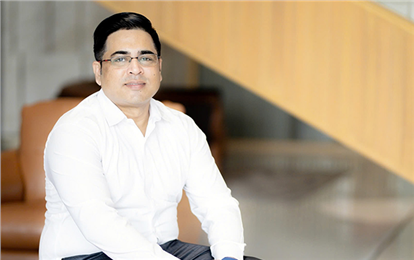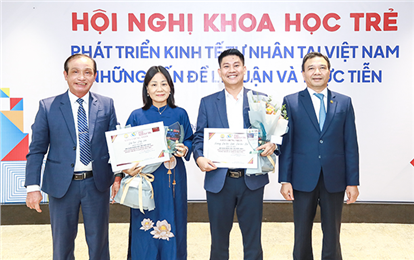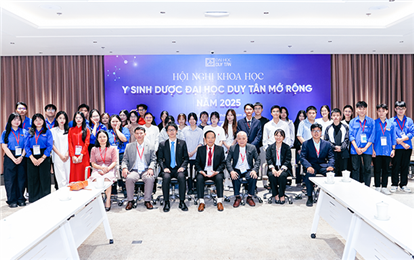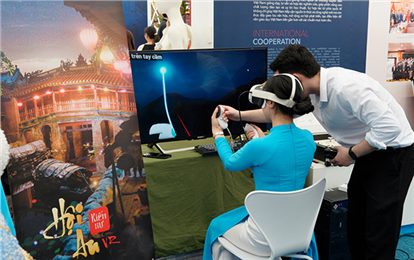Research
DTU Scientist Co-Authors International Paper on COVID-19
On August 31, the journal “Chemical Society Reviews”, published by the Royal Society of Chemistry in the UK, added a paper entitled: “The interaction of SARS-CoV-2 with host cells and antibodies: Experiment and Simulation”. The article was authored by scientists in Poland and Vietnam, the members of a research group led by Professor Mai Xuan Ly from the Institute of Physics at the Polish Academy of Sciences. “Chemical Society Reviews” is the leading journal that publishes articles on Chemistry research, and has a 2022 IF of 46.2, an H-index of 595, and Q1 rank in SCIE. To write a review, authors must complete a proposal and have it approved by independent reviewers. Only then can the research team start writing their review.



The Chemical Society Reviews journal
The first author of the paper is Nguyen Van Hung, a PhD student in the Institute of Physics at the Polish Academy of Sciences, and the co-first author is Dr. Nguyen Hoang Linh from the DTU Institute of Fundamental & Applied Sciences (IFAS). The publication is recognized for giving the research community a general perspective on the latest experimental and simulation results concerning the interaction of SARS-CoV-2 with host cells and antibodies.
“When our group presented the proposal, the “Chemical Society Reviews” Board offered us their strong support,” said Dr. Linh. It was a really important study, because when the COVID-19 pandemic broke out in 2021, many papers were published on penetration ability, infection rates, and the search for drugs and antibodies to treat it.
These articles provided a wealth of information, but were quite fragmented, preventing inexperienced scientists from entering the research field because of their complexity. Meanwhile, newly emerging variants were posing new challenges to the neutralizing ability of antibodies, and previously available reviews did not consider simulation and experimentation on the interactions of the virus with host cells and antibodies. This gave us the idea to write an article to systematize the research results, and to create contingency plans to fight new variants whenever or whereever they might appear in the future.”
The paper achieved its initial purpose of presenting the latest achievements in simulation and experimental studies on the links between host cells and SARS-CoV-2, when the virus attaches to a cell, enters it, and is neutralized by antibodies. In addition, the role of mutations that increase viral infection rate and antibody evasion in new variants was explained.
The publication stressed that the future of the COVID-19 situation remains complicated, with the emergence of new variants, many with unknown mutations which may affect virulence and the ability to evade antibodies. There is no room left for complacency, although existing tools have proven successful in studying SARS-CoV-2 from initial penetration to the development of anti-viral antibodies, which increases our confidence in dealing with new variants.

From right to left: The authors Dr. Nguyen Hoang Linh (DTU), Professor Mai Xuan Ly
(Polish Academy of Sciences), and Dr. Nguyen Quoc Thai (Dong Thap University)
The group also discussed current issues that scientists can continue to research, specifically:
- Models that evaluate the binding energy between viral and human proteins, such as all-atom molecular dynamics models, coarse-grained models, and AI, which have several advantages and disadvantages, do not yet provide the perfect solution and require further research
- The appearance of potential receptors for SARS-CoV-2 to enter host cells, predicted by both experiment and theory, has raised the issue of how these receptors will affect the entry of the virus into a cell
- The interaction mechanism between these potential receptors and the virus has not yet been clarified
- Virus-host cell membrane fusion plays a key role in virus entry, but the change in free energy between before and after fusion has not yet been evaluated, either experimentally or through simulation.
“This is a very useful study involving many Polish and Vietnamese scientists, sponsored by the National Science Center of Poland, the Polish and German ministries for universities and education, and the German Max Planck Institute,” said Professor Ly. “Although the COVID-19 pandemic has been brought under control, new variants still regularly appear. Although they are so far less dangerous, we can’t be sure that new strains will never be a threat to human life again.”
“In terms of pure science, many issues related to the interaction between virus and host cell have not yet been elucidated at the atomic level. Therefore, governmental and non-governmental organizations continue to invest money and effort in this area of research, to find better and safer solutions for COVID-19 prevention and gain a deeper understanding in the nature of the virus. Our article is a compilation of most of the relevant information about COVID-19, from both experimental and computational-simulation approaches. As an overall picture, it provides a large amount of knowledge about COVID-19 which researchers can rely on to get easier access to the field and obtain a more general overview in preparation for their research.”
Dr. Linh added: “Even though we work in two different countries and completely online, our scientists fully understand each other, which enabled the study to proceed extremely smoothly. At DTU, I’m currently focused on researching the interaction mechanism of SARS-CoV-2 with the host, using simulations. In addition, I have expanded my research on fluid dynamics. The work environment at DTU is ideal for fundamental research. In particular, the leadership at all levels understands the specifics of fundamental research and always supports us, allowing us to work, exchange ideas, and cooperate freely with colleagues at home and abroad to achieve the optimum results.”
(Media Center)
Other News



